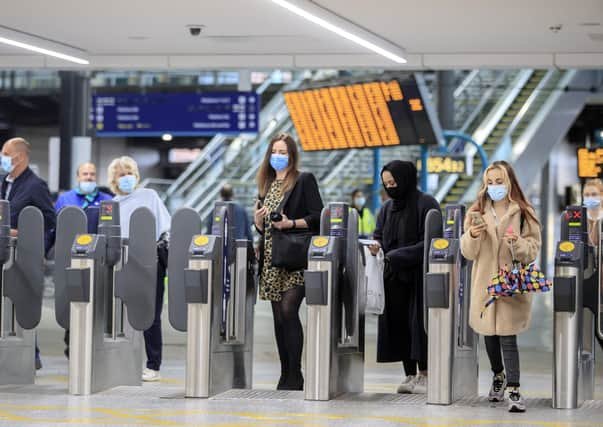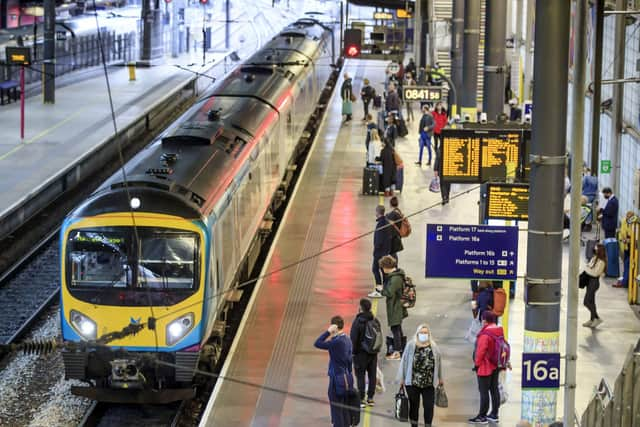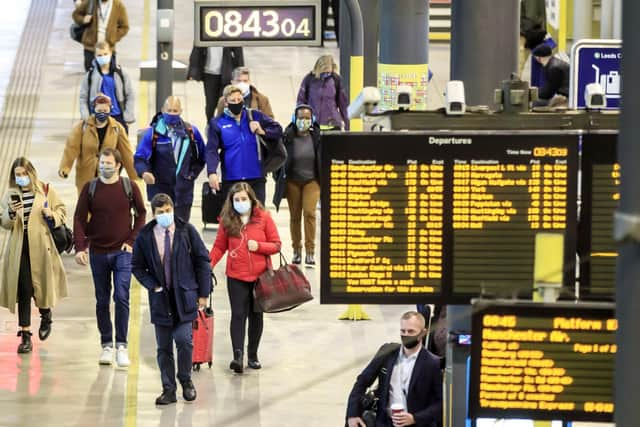How I miss our badly overcrowded trains as virus takes its toll – Bill Carmichael


But this week I have developed an unexpected fondness for those bad old days of train travel before the whole world changed utterly in March 2020 as a result of the Covid-19 pandemic.
Since the partial easing of the lockdown I’ve travelled into work by car a few times and that is a strange experience, bowling along the normally jam-packed M62 and M1 with hardly another car in sight.
Advertisement
Hide AdAdvertisement
Hide AdHowever nothing prepared me for the unsettling weirdness of my normal public transport commute which I re-started this week. Everyone – that is the comparatively few who now brave the trains – has to wear a mask, of course, and there are strict one-way systems in operation at all stations.


On one day this week, on an early morning service to Leeds – normally standing room only – I was the only passenger in my carriage for almost the entire journey. At Leeds, the area at the bottom of the escalators would normally be pulsating with people at 7.45am on a weekday morning, but on this occasion it was virtually empty.
I kept having to remind myself that it was mid-September with the children back at school and most people back from summer holiday. Normally the period between September and Christmas is one of the busiest of the year, but not now.
The express train heading south, the one that goes down to Birmingham and Bristol and beyond, was slightly busier, but nothing like the bursting at the seams conditions we normally experience on this service.
Advertisement
Hide AdAdvertisement
Hide AdThe same story at Sheffield station – eerily quiet like a post-apocalyptic scene from a dystopian TV series.


I noticed that although some of the bigger stores in the stations had re-opened such as Marks & Spencer, WH Smiths and Starbucks, many of the smaller outlets remain closed.
Those businesses that rely on passing commuter trade – the coffee and sandwich shops and convenience stores– have been hit so badly by the shutdown there are doubts that many will ever recover.
And that is the tragedy of the current situation summed up in a single word – jobs.
Advertisement
Hide AdAdvertisement
Hide AdMany of those missing commuters may be happily working from home, finding it more convenient and cheaper to set up an office in the spare bedroom.
They may not miss the commuting, but I suspect many of them miss the human contact that work offers and the Friday evening drinks with colleagues after work.
But for some people – an increasing number according to this week’s unemployment figures – their jobs have simply disappeared and they find themselves relying on benefits, not good either for them personally or for the economy as a whole.
Unemployment grew to 4.1 per cent in the three months to July, with young people aged between 16 and 24 particularly badly hit. And there are fears of even higher rises once the Government’s Jobs Retention Scheme finishes on October 31.
Advertisement
Hide AdAdvertisement
Hide AdSo those packed trains, unpleasant and frustrating though the journey could be at times, represented an economic vitality, part of the jobs miracle we have witnessed in recent years, which made us such a successful country (unlike much of the moribund EU).
Each of those busy commuters was supporting their families, spending money with local businesses and thereby creating jobs, and paying the taxes to the Government to provide health care, education and a benefits system to help the whole of society.
My fear is that many of those empty seats I witnessed on my commutes this week represent a loss to our country that we may never get back.
Perhaps in time things will get back to normal, and I will experience the delights of an overcrowded cattle truck train once again. I hope so, because if we don’t all get back to work, our country is in for a very tough few years.
Advertisement
Hide AdAdvertisement
Hide AdAnd one horrible thought occurred to me as I sat on my near empty train. If the passengers don’t return, what exactly is the point of HS2 and HS3?
Support The Yorkshire Post and become a subscriber today.
Your subscription will help us to continue to bring quality news to the people of Yorkshire. In return, you’ll see fewer ads on site, get free access to our app and receive exclusive members-only offers.
So, please - if you can - pay for our work. Just £5 per month is the starting point. If you think that which we are trying to achieve is worth more, you can pay us what you think we are worth. By doing so, you will be investing in something that is becoming increasingly rare. Independent journalism that cares less about right and left and more about right and wrong. Journalism you can trust.
Thank you
James Mitchinson
Comment Guidelines
National World encourages reader discussion on our stories. User feedback, insights and back-and-forth exchanges add a rich layer of context to reporting. Please review our Community Guidelines before commenting.